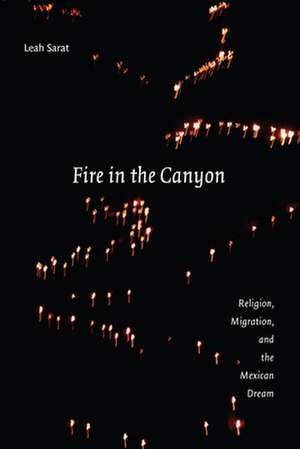Fire in the Canyon – Religion, Migration, and the Mexican Dream
Autor Leah Saraten Limba Engleză Paperback – 10 noi 2013
| Toate formatele și edițiile | Preț | Express |
|---|---|---|
| Paperback (1) | 226.24 lei 6-8 săpt. | |
| MI – New York University – 10 noi 2013 | 226.24 lei 6-8 săpt. | |
| Hardback (1) | 526.01 lei 6-8 săpt. | |
| MI – New York University – 10 noi 2013 | 526.01 lei 6-8 săpt. |
Preț: 226.24 lei
Nou
Puncte Express: 339
Preț estimativ în valută:
43.29€ • 45.32$ • 35.82£
43.29€ • 45.32$ • 35.82£
Carte tipărită la comandă
Livrare economică 05-19 aprilie
Preluare comenzi: 021 569.72.76
Specificații
ISBN-13: 9781479839780
ISBN-10: 1479839787
Pagini: 252
Dimensiuni: 152 x 229 x 15 mm
Greutate: 0.38 kg
Ediția:New.
Editura: MI – New York University
ISBN-10: 1479839787
Pagini: 252
Dimensiuni: 152 x 229 x 15 mm
Greutate: 0.38 kg
Ediția:New.
Editura: MI – New York University
Recenzii
Through finely woven voices and descriptions of actors and locations in a life drama that transcends geographical and religious borders, Leah Sarats ethnography of the indigenous people of El Alberto . . . offers its readers an opportunity to witness the fantastic capacity of seemingly marginal peoples to selectively appropriate religious and economic impositions in an effort to carve out a future that makes sense to them, and, hopefully their children.-Ella Schmidt,author of The Dream Fields of Florida: Mexican Farmworkers and the Myth of BelongingBeautifully illustrates the complex intersections of religion and immigration, where even the successful navigation of the dangerous migrants journey across the U.S. border results not in the `American dream, but in continued poverty and marginalization. . . . Religion within the context of immigration is not merely one of `the things they carry, but fundamental to the journey, helping migrants to frame their understanding of suffering, to confront life-and-death, and to define their notions of the possible. Yet Sarat suggests that this understanding alone is not enough, arguing that religionmodern Pentecostalism in particularhelps empower people to look beyond simple religious tropes and issues of individual salvation to join collective efforts that seek to address the roots causes of migration and inequality.-Virginia Garrard-Burnett,The University of Texas at Austin
"Through finely woven voices and descriptions of actors and locations in a life drama that transcends geographical and religious borders, Leah Sarat's ethnography of the indigenous people of El Alberto ... offers its readers an opportunity to witness the fantastic capacity of seemingly marginal peoples to selectively appropriate religious and economic impositions in an effort to carve out a future that makes sense to them, and, hopefully their children."-Ella Schmidt,author of The Dream Fields of Florida: Mexican Farmworkers and the Myth of Belonging"Beautifully illustrates the complex intersections of religion and immigration, where even the successful navigation of the dangerous migrant's journey across the U.S. border results not in the 'American dream,' but in continued poverty and marginalization... Religion within the context of immigration is not merely one of 'the things they carry,' but fundamental to the journey, helping migrants to frame their understanding of suffering, to confront life-and-death, and to define their notions of the possible. Yet Sarat suggests that this understanding alone is not enough, arguing that religion - modern Pentecostalism in particular - helps empower people to look beyond simple religious tropes and issues of individual salvation to join collective efforts that seek to address the roots causes of migration and inequality."-Virginia Garrard-Burnett,The University of Texas at Austin
"Through finely woven voices and descriptions of actors and locations in a life drama that transcends geographical and religious borders, Leah Sarat's ethnography of the indigenous people of El Alberto ... offers its readers an opportunity to witness the fantastic capacity of seemingly marginal peoples to selectively appropriate religious and economic impositions in an effort to carve out a future that makes sense to them, and, hopefully their children."-Ella Schmidt,author of The Dream Fields of Florida: Mexican Farmworkers and the Myth of Belonging"Beautifully illustrates the complex intersections of religion and immigration, where even the successful navigation of the dangerous migrant's journey across the U.S. border results not in the 'American dream,' but in continued poverty and marginalization... Religion within the context of immigration is not merely one of 'the things they carry,' but fundamental to the journey, helping migrants to frame their understanding of suffering, to confront life-and-death, and to define their notions of the possible. Yet Sarat suggests that this understanding alone is not enough, arguing that religion - modern Pentecostalism in particular - helps empower people to look beyond simple religious tropes and issues of individual salvation to join collective efforts that seek to address the roots causes of migration and inequality."-Virginia Garrard-Burnett,The University of Texas at Austin
